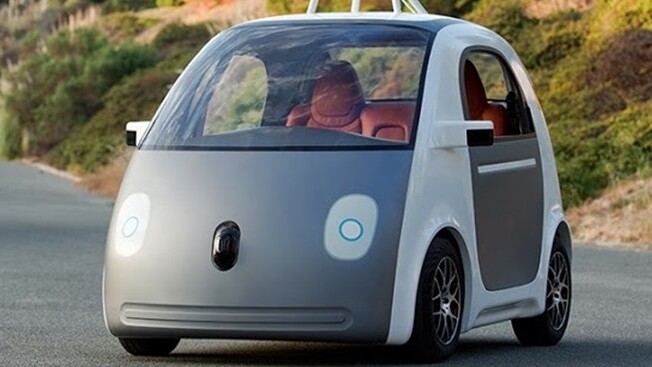
Google’s co-founder Sergey Brin announced at the Code Conference today that the company has built a number of prototype self-driving cars from scratch.
Google’s prototype cars don’t need a human to intervene at all — which means there isn’t a steering wheel, accelerator pedal or brake pedal. Instead, software and sensors replace all of those.
The company says that the automobiles will be very “basic” — as it wants to adapt them as quickly as possible to different use-cases, but the bottom line is that they will transport you to your destination at the push of a button.

Most importantly, Google says that its self-drive vehicles focus on safety. They come equipped with sensors that remove blind spots, and can detect objects at a distance of more than two football fields in all directions, which the company notes is helpful particularly on busy streets with several intersections. Google has also limited the speed of its first prototype vehicles at 25 mph.
On the inside, it acknowledges that the cars are “light on creature comforts” — so they may not be the most luxurious or comfortable vehicles ever. All it has are two seats with seatbelts, a space for you to put your belongings, buttons to start and stop, and a screen that displays the route.
Google is planning to build about a hundred prototypes, and its safety drivers will start plying the roads later this summer with early test versions of these vehicles that have manual controls. After that, Google is intending to run a small pilot program in California over the next couple of years.
“We’re going to learn a lot from this experience, and if the technology develops as we hope, we’ll work with partners to bring this technology into the world safely,” Google says.
In terms of a business model for the self-driving car, it seems like Google could either partner with car-for-hire service Uber, or even possibly develop an Uber-like service by itself.
Brin on self-driving car business model: “We are almost certainly going to partner with a lot of companies — possibly Uber” #codecon
— Doug MacMillan (@dmac1) May 28, 2014
This is likely still some time off though, and we have to wait for Google to iron out the issues that will almost certainly crop up, before its self-driving cars can be commercialized.
Headline image via Google
Get the TNW newsletter
Get the most important tech news in your inbox each week.




